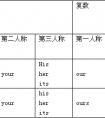用所给词的适当形式填空。1. You must do your homework by(you).2. The No. 15 bus(stop) here, doesn't it?3. It's better to do some reading on (rain) days.4-八年级英语
1.表示有生命的东西的名词末尾加's。例如:
Jim's bed
the man's wife
children's toys
the fox's tail
2.以-es或-s结尾的名词末尾加"'s"。例如:
the students' books
Teachers' Day
my boss' office
a girls' dormitory
3.有些表示时间、距离、度量衡、价值、自然现象、国家、城镇等无生命东西的名词,也可以加's构成所有格。例如:
today's newspaper five minutes'walk a ton's weight a dollar's worth of stamps the moon's rays
4.表示两者共同拥有的人或物(共有)时,只需要后一个名词加's(或')即可。如果表示两者各自的所属关系(各自所有),则每个名词词尾都加上's(或')。例如:
Joan and Jane's room(房间属二人共同所有)
Joan's and Jane's room(指Joan和Jane各自的房间)
5.'s所有格所修饰的词的省略现象
a、表示诊所、店铺或某人的家等地点名词,其名词所有格后的被修饰语常常省略。例如:
I met her at the doctor's(office).我在诊所遇见了她。
He has gone to the tailor's(shop).他到服装店去了。
She went to Mr.Black's(house)yesterday.她昨天到布莱克先生家去了。
b、名词所有格所修饰的词,如果前面已经提到过,往往可以省略,以免重复。例如:
Whose pen is this?It's Tom's.这是谁的钢笔?是汤姆的。
The bike is not mine,but Wang Pinpin's.这辆自行车不是我的,是王品品的。
二、of 所有格的用法
of 所有格由of 加名词构成,其用法归纳如下:
1.of所有格一般用于无生命的东西的名词中。例如:
a map of the world
the story of a hero
the windows of the room
the title of the film
2.用于名词化的词。例如:
the sticks of the blind 盲人的拐杖
3.修饰词较多时也可用of所有格。例如:
the very long and graceful tail of the black cat 黑猫的又长又美的尾巴
4.表示有生命的东西的名词,有时也可以用of所有格。例如:
the children of the family 那家的孩子们
某些of所有格和's所有格可以互换。
the son of a poor peasant=a poor peasant's son 一个贫农的儿子
但有时含义却不相同,请比较下面的例子:
an old woman's story(一个老妇人讲自己的身世)
the story of an old woman(别人讲一个老妇人的身世)
三、's所有格和of所有格可以表示下面的关系:
1.所有关系
the students'reading room 学生阅览室
2.主谓关系
the arrival of the train 火车的到达
3.动宾关系
the search of knowledge 知识的探究
4.同位关系
the name of Kate 凯特这个名字
四、双重所有格及其用法
's所有格和of所有格两种所有格形式结合在一起,构成"of+所有格"形式,即双重的所有格。
它通常表示部分观念,即全体中的一部分,在意义上与"one of..."相似,它主要修饰of短语之前的那个名词。
此外,双重所有格与指示代词连用时,常带有感情色彩,如赞赏、不满、厌恶等。它的主要形式如下:
1.名词+of+名词性物主代词。例如:
a good friend of mine 我的一个好朋友
an interesting story of his 他的有趣的经历
2.名词+of+'s所有格。例如:
He is a friend of my sister's.(=one of my sister's friends)他是我姐姐的一个朋友。
Look at that long nose of Jack's.看杰克的那个长鼻子。(感情色彩)
试比较:
a picture of Xiao Zhang 小张(本人)的照片
a picture of Xiao Zhang's 小张(具有的照片中)的一张照片
此外,不定冠词、数词、某些不定代词(some,any,many,no,few等)以及which等限定词,
一般不与形容词性物主代词或's所有格等一起放在名词前修饰名词,而采用of所有格或双重所有格形式。例如:
most of the students 学生中的大多数
three of them 他们中的三个人
I have read some books of his.我读过他的一些书。
Which book of Qiong Yao's have you read?你读过琼瑶的哪一本书?
考点名称:形容词
- 形容词:
简称adj.或a,形容词用来修饰名词或代词,表示人或事物的性质、状态,和特征的程度好坏与否,形容词在句中作定语,表语,宾语补足语。
她是一个好学生,她学习努力。She is a good student, and she works hard.
这辆自行车很贵。This bike is expensive.
对不起,我现在很忙。I am sorry, I'm busy now.
你为这次会议做好准备了吗? Have you got everything ready for the meeting? - 形容词的语法功能:
一、作定语
He is the greatest writer alive.他是依然健在的伟大的作家。
Somewone else has done it.别人已经做了这事。
二、作补语
形容词做主语补足语和宾语补足语时,可以表示其现状、状态,也可以表示某一动作的结果,并常用在表示“认为,看待”的动词如believe,prove,consider等候。例如:
The news made her sad.这消息使他感到非常悲伤。
Don't marry young.不要早婚。
三、作状语
形容词或形容词短语可作状语,形容词作状语时,可以看作是“being+形容词”结构的省略,可表示时间、原因、条件、方式、强调或伴随状况等意义。例如:
Enthusiastic,they are co-operative.热心的时候他们是很合作的。
Rich or poor, young or old, we all have problems.不管是穷人还是富人,不管是年轻人还是老人,我们都有问题。
四、做表语
The ship was adrift on unknown seas.那艘船在陌生的海域漂流。
五、做主语
Old and young joined the discussion.
Rich or poor meant the same to him.作感叹语
Very good!Say it again.
Stupid!He must be crasy. 形容词的几个特殊用法:
most 同形容词连用而不用 the, 表示 " 极,很,非常, 十分"。
It's most dangerous to be here. 在这儿太危险。
I cannot do it, it's most difficult. 我干不了这件事,太难了。
"The+形容词比较级..., the+形容词比较级..." 表示 " 越... 就越..."。
The more you study, the more you know. 你学的越多, 就知道的越多。
The more I have, the more I want. 我越有就越想要有。
The more, the better. 越多越好。
" 形容词比较级 + and + 形容词比较级 ", 表示 " 越来越... "。
It's getting hotter and hotter. 天气越来越热了.
It's pity he is getting poorer and poorer. 真可怜他越来越穷了。
The computer is cheaper and cheaper. 计算机越来越便宜。
The more and more people focus on the meeting next year. 越来越多的人关注明年的会议。
主语+谓语(系动词)+as+形容词原形+as+从句。表示两者对比相同。
This box is as big as mine. 这个盒子和我的一样大。
This coat is as cheap as that one. 这件衣服同那件衣服一样便宜。
I study English as hard as my brother. 我同我兄弟一样学习努力。
the + 形容词 表示某种人。
He always helps the poor. 他经常帮助穷人。
I like to have a talk with the young. 我喜欢同年轻人谈话。
The rich sometimes complain their empty life. 富人有时抱怨他们空虚的生活。
The police led the old man across the street. 警察领老人横过马路。以-ly结尾的形容词
1) 大部分形容词加-ly可构成副词。但 friendly,deadly,lovely,lonely,likely,lively,brotherly,仍为形容词。
改错:(错) She sang lovely. (错) He spoke to me very friendly.
(对) Her singing was lovely. (对) He spoke to me in a very friendly way.
2)有些以-ly 结尾的词既为形容词,也为副词。
daily,weekly,monthly,yearly,early
The Times is a daily paper.
The Times is published daily.too+adj.+to句型 “太…而不能”
He is too young to go to school.
=He isn’t old enough to go to school.
=He is so young that he can’t go to school.形容词的位置:
1.形容词一般放在名词前作定语?
单个形容词修饰名词时,一般要放在名词的前面。它们的前面常常带有冠词、形容词性物主代词、指示代词、数词等。例如:?
a red flower一朵红花?
an interesting story一个有趣的故事?
six blind men 六个盲人?
my own house我自己的房子?
如果有两个或两个以上的形容词修饰一个名词时,则由它们和被修饰的名词之间的密切程度而定,越密切的形容词越靠近名词。
如果几个形容词的密切程度差不多则按音节少的形容词放在前面,音节多的形容词放在后面。
2.当形容词所修饰的词是由some,any,every,no等构成的不定代词时,形容词必须置于名词之后。例如:?
She has something new to tell me.?她有一些新的情况告诉我。?
I have nothing important to do today.?今天我没有重要的工作要做。?
- 最新内容
- 相关内容
- 网友推荐
- 图文推荐
| [家长教育] 孩子为什么会和父母感情疏离? (2019-07-14) |
| [教师分享] 给远方姐姐的一封信 (2018-11-07) |
| [教师分享] 伸缩门 (2018-11-07) |
| [教师分享] 回家乡 (2018-11-07) |
| [教师分享] 是风味也是人间 (2018-11-07) |
| [教师分享] 一句格言的启示 (2018-11-07) |
| [教师分享] 无规矩不成方圆 (2018-11-07) |
| [教师分享] 第十届全国教育名家论坛有感(二) (2018-11-07) |
| [教师分享] 贪玩的小狗 (2018-11-07) |
| [教师分享] 未命名文章 (2018-11-07) |

![One of the climbers tried to pull ______up the rocks. Finally, he was lucky to get to the top. [ ]A. themselves B. himselfC. herself D. itself-八年级英语](http://www.00-edu.com/d/file/ks/4/2/fanshendaici/2019-12-01/small41ed7588e270175b6fd8ba260e900d321575203896.png)
![Sally buys a watch for father andasweater for_______.[ ]A. she; herselfB. her; herselfC. herself; herD. her; her-七年级英语](http://www.00-edu.com/d/file/ks/4/2/fanshendaici/2019-12-01/small3f1788cd5867bf4768797f36ec9e81961575203859.jpg)


![Don't lose ________ computer games, little boys! [ ]A. yourself toB. yourself in C. yourselves to D. yourselves in-八年级英语](http://www.00-edu.com/d/file/ks/4/2/fanshendaici/2019-12-01/smallce83f3a5e50b48d2e8ee989a20c11b101575203887.png)
